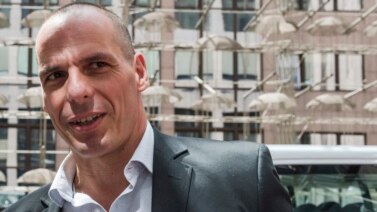Politicians in Europe continue to discuss whether Greece will remain in the Eurozone, the group of countries that use the Euro as their money. These discussions likely seem far away for Greeks who are poor. They have been dealing with reduced levels of public services for more than five years.
If Greece is to remain in the Eurozone and if lenders agree to provide additional loans, it is likely that there will be even more cuts in government spending. This will lead to even fewer public services. Greeks know this, and they are answering the crisis by helping one another as much as they can.
Greeks who are homeless, jobless, old or poor seek medical care from groups like Doctors of the World, in the capital Athens. Many immigrants have also come to the clinic for free care.
Volunteer doctors and dentists treat everyone. They do not ask who they are or why they are there. The medical workers are struggling to deal with the number of people who need help.
Dr. Bettina Krumbholz says the country’s health care system began to deteriorate when the debt crisis began in 2008.
“We used to have a very good system, and it really used to work quite efficient(ly). But after they had to fire so many doctors, the system got very poor. And there’s a lack of nurses, there’s a lack of doctors. So the people, they’re waiting for 10, 12, even more hours in the line.”
Dr. Krumbholz says the limits put in place two weeks ago on how much money Greeks can withdraw from the bank have made the situation worse.
“They don’t have money to get the medicine. So we have even many Greek patients that come here only to get their medication. We cannot leave people dying on the streets, out of hunger, out of lack of medication, of medicine, out of lack of doctors.”
Greeks are dealing with the crisis by giving one another health care, legal advice and food.
Konstantinos Polychronopoulos is cooking a large meal of chicken stew at what he calls the “Social Kitchen” in Monastiraki Square in the center of Athens. Mr. Polychronopoulos lost his job as a marketing manager four years ago. He has tried to get another job but employers tell him that, at 51, he is too old. Others said he was too highly-educated for the low-skill jobs for which he was applying. So he now spends his time giving free meals to everyone, whether they are rich or poor.
He says he began giving away meals when he saw two boys fighting about who would eat a piece of food they had found at a garbage dump. He said the fight did not bother him as much as seeing other people ignore it.
Even if Europe agrees to another deal to rescue Greece, many Greeks will continue to suffer, especially those who are already suffering the most.
I’m Christopher Jones-Cruise.
Correspondent Henry Ridgwell reported this story from Athens. Christopher Jones-Cruise adapted it for VOA Learning English. Mario Ritter was the editor.
Words in This Story
clinic – n. a place where people get medical help
deteriorate – v. to become worse as time passes
system – n. a way of managing, controlling, organizing or doing something that follows a set of rules or a plan
efficiently – adv. producing desired results without wasting materials, time or energy
fire – v. to dismiss (someone) from a job
garbage dump – n. an area where trash and food waste is placed; a place where things that are no longer useful or wanted have been thrown out
How are poor people cared for in your country? We want to hear from you. Write your thoughts in the comments section.

